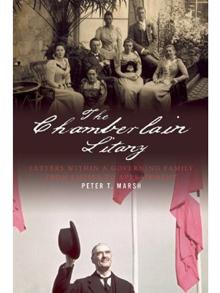The Chamberlain Litany by Peter T. Marsh
 I got a copy of The Chamberlain Litany by Peter T. Marsh from Haus Publishing, who you may remember also published The Mystery of Lewis Carroll by Jenny Woolf. I was particularly intrigued by the description following the title of the book, “Letters Within a Governing Family from Empire to Appeasement.”
I got a copy of The Chamberlain Litany by Peter T. Marsh from Haus Publishing, who you may remember also published The Mystery of Lewis Carroll by Jenny Woolf. I was particularly intrigued by the description following the title of the book, “Letters Within a Governing Family from Empire to Appeasement.”
I will admit to knowing very little of early 20th century British history and even less about the Chamberlain family, and these were two reasons I was interested in reading this book — to learn. The other reason was because I absolutely adore reading personal and family histories through people’s own hands, through their written words preserved over the years.
The Chamberlain Litany paints a fascinating portrait of one of the most prominent and powerful British political families, which included patriarch and statesman Joseph, sons Sir Joseph Austen (statesman and recipient of the Nobel Peace Prize) and Neville (UK Prime Minister from 1937-1940), and daughters Beatrice, Ida, Hilda, and Ethel.
Marsh’s writing is engaging, clear, and his contentions are well-supported through extensive research. The most interesting aspect of the book to me was how much the daughters were involved in political discussions and debate — and that their opinions were well-respected; of course with that respect came somewhat of an obligation to support and help sustain the males’ political careers, which may have been part of the reason three of the four sisters never married. It seems to me a book about the Chamberlain women would be a worthy pursuit as well.
The Chamberlain Litany also speaks to my American history interests as well as to my passion for Italy; various members of the family interact with the likes of Theodore Roosevelt, Henry Cabot Lodge, and other notable Americans of the time. The Chamberlains also spend a lot of time in Italy, and, on the political side, there is, of course, plenty of talk of Il Duce himself, Benito Mussolini. That said, the sections about Neville’s relationship with Adolf Hitler and how appeasement came to be are surely highlights for the universal reader.
I should mention, though, that you don’t have to worry if you don’t know much about early 20th century British history; Marsh includes a handy timeline in the back of the book to catch you up to speed.
My only real criticism, if you can call it that, is that I would have liked to have seen more full letters reprinted, without necessarily being woven into a larger narrative via snippets. While the latter is certainly a useful and effective writing technique, it did take away from some of the personality of the letters that otherwise may have come through.
Overall, I would say if this a topic you feel like you’d be interested in, this is a worthy read. I would recommend, though, that if you don’t know much about the Chamberlains, read some background information on them to get you interested in their lives. This is a nonfiction book, so there isn’t the same kind of character development you might see in a novel — and if you don’t give a whit about the main players in the book from early on, you might lose interest, and that would be a shame.
*
Subscribe to my Book Reviews feed — book reviews ONLY, which aren’t published to the main feed — by visiting Feedburner.













